Had enough of supervisors breathing down your neck? Maybe it’s time to be your own boss. If you decide to start a business, your top options willm ...
You might consider targeting a niche, such as body butter for eczema.
We earn commissions if you shop through the links below. Read more
Written by: Carolyn Young
Carolyn Young is a business writer who focuses on entrepreneurial concepts and the business formation. She has over 25 years of experience in business roles, and has authored several entrepreneurship textbooks.
Edited by: David Lepeska
David has been writing and learning about business, finance and globalization for a quarter-century, starting with a small New York consulting firm in the 1990s.
Published on June 23, 2023
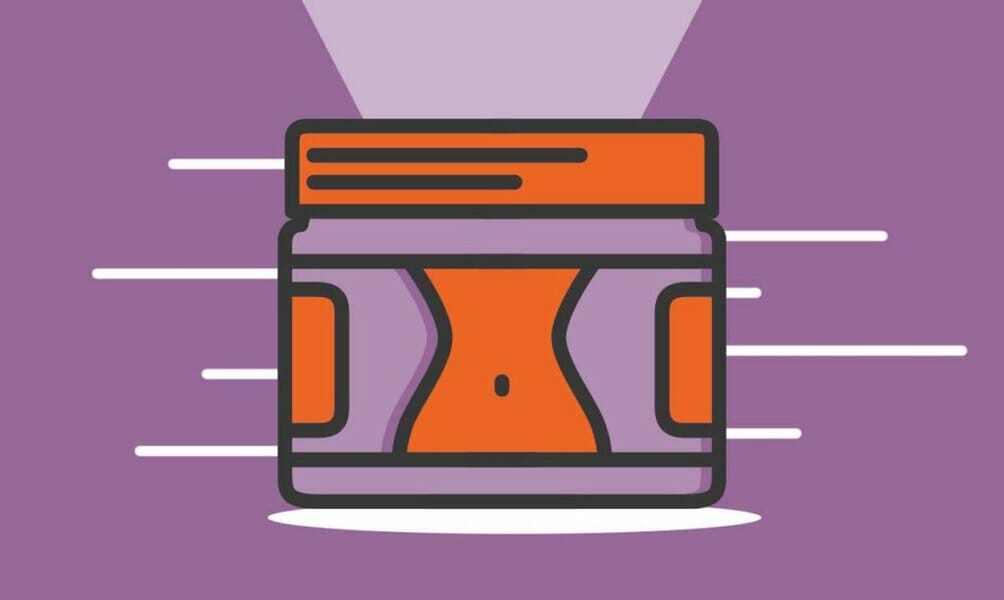
Investment range
$2,600 - $5,800
Revenue potential
$78,000 - $780,000 p.a.
Time to build
0 – 3 months
Profit potential
$46,800 - $195,000 p.a.
Industry trend
Growing
Commitment
Flexible
Key details to focus on when starting your body butter business:
Is a body butter business profitable?
A body butter business can be profitable depending on factors like product quality, target market, marketing strategies, and operational efficiency. The growing demand for natural and luxurious skincare products creates potential profitability in the body butter industry. However, success depends on effective branding, customer satisfaction, and sound financial management.
What happens during a typical day at a body butter business?
A typical day at a body butter business involves various activities. This includes manufacturing batches of body butter products, managing inventory of raw materials and finished goods, packaging and labeling products, processing orders, marketing and sales efforts, customer service, research and development, and financial management.
What is the growth potential of a body butter business?
The growth potential of a body butter business can be significant due to increasing demand for natural and organic skincare products, market trends favoring self-care and wellness, the global reach of e-commerce, branding and differentiation, and the opportunity for diversification and expansion into related skincare items.
What type of business is a body butter business?
A body butter business falls under the skincare industry and can be classified as a retail or e-commerce business. It can also be a manufacturing business if the company produces its own body butter products or operate as a reseller sourcing products from various suppliers.
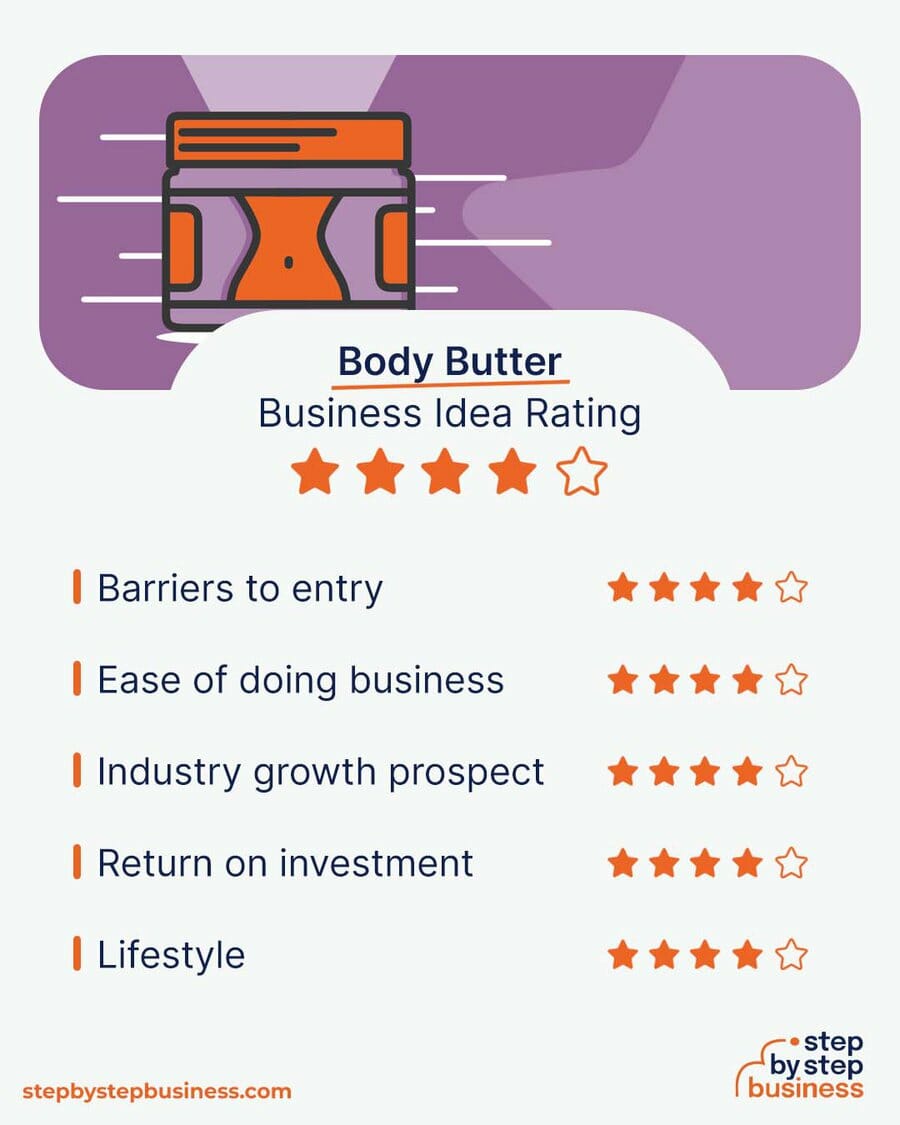

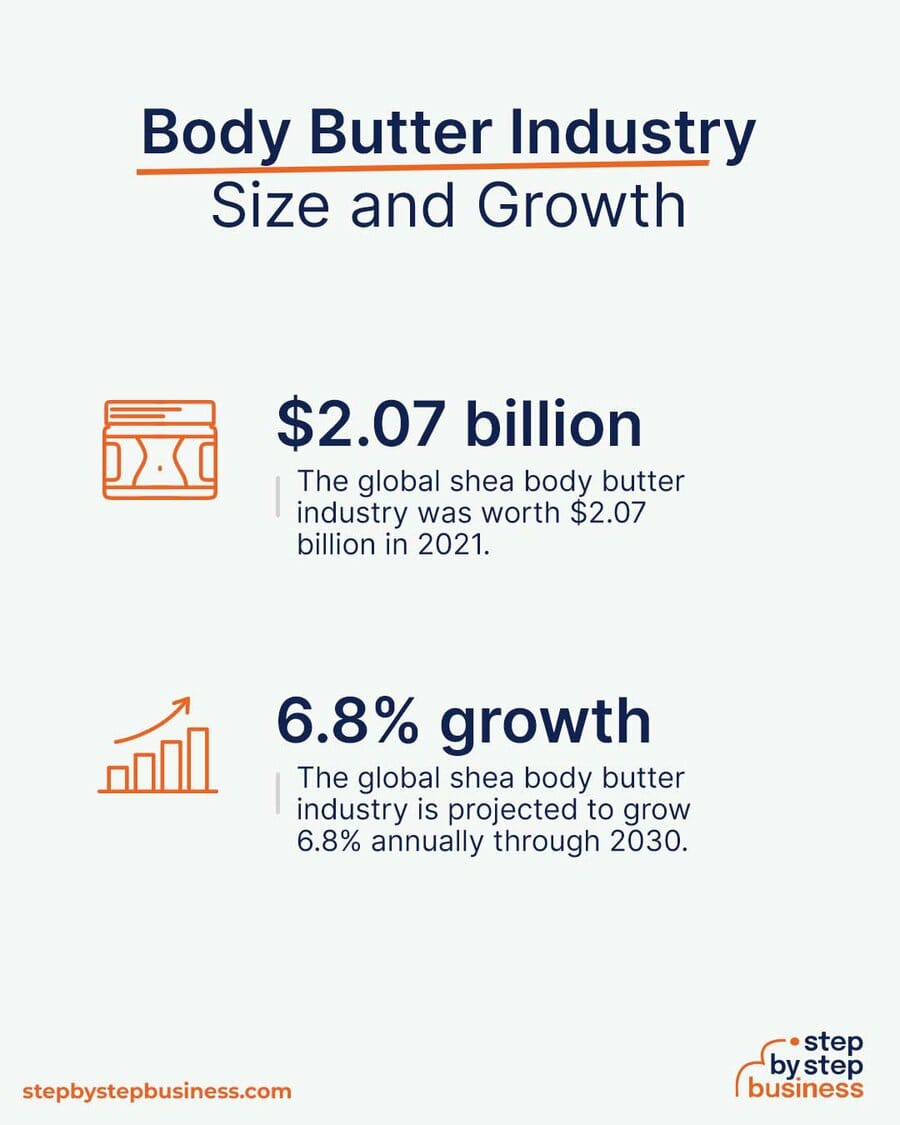
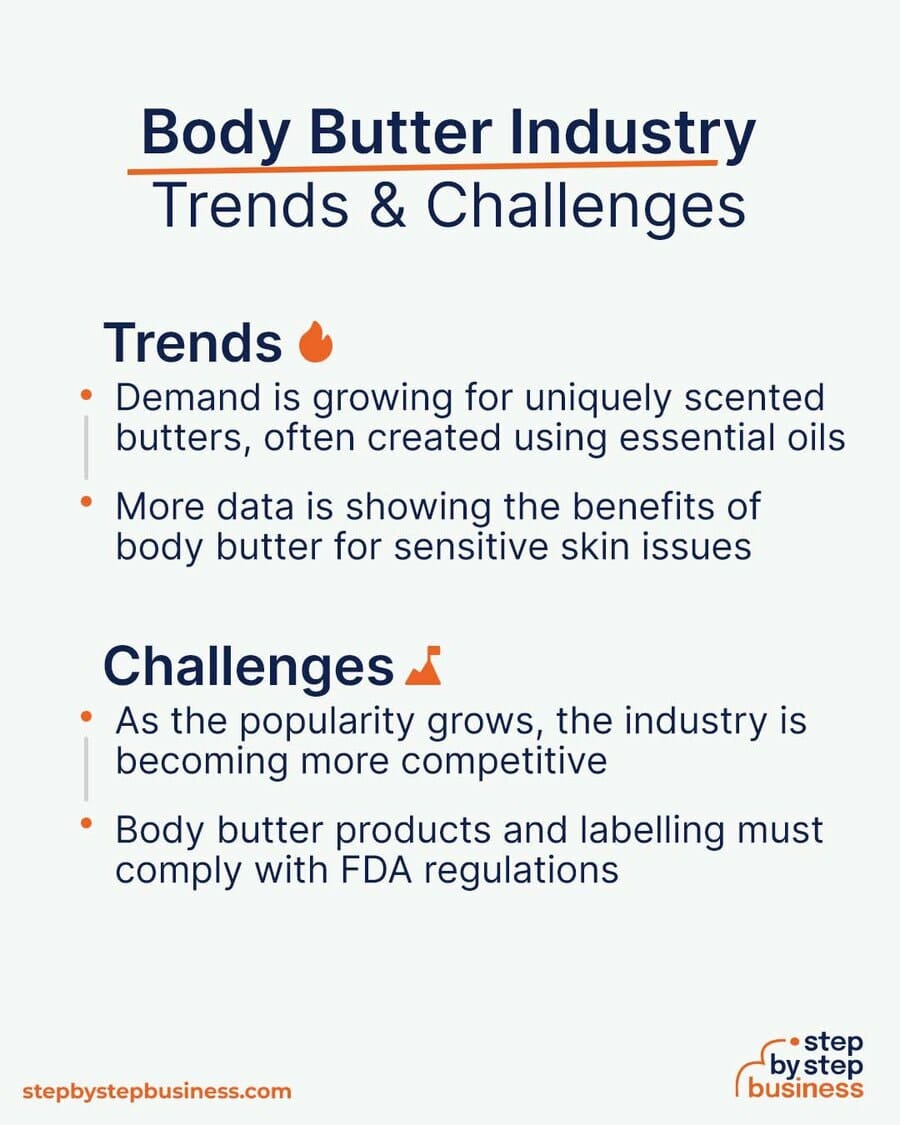
Trends
Challenges
Startup costs for a body butter business if you’re going to make it and package it from home range from $2,500 to $6,000. Costs include ingredients, packaging and labeling materials, and a marketing budget.
Alternatively, you can find premade body butters from manufacturers that you can sell under your own brand name, or you can find a manufacturing partner that will work with you to manufacture your recipes. Going the latter route will come with a more significant cost.
You could start small making your body butters at home, and once you’ve gained some traction, find a manufacturing partner.
When you’re making your body butters from home, one interesting sales option could be to open a mall kiosk. That would add to your startup costs but could bring in more revenue.
You’ll need a handful of items to successfully launch your body butter business, including:
| Start-up Costs | Ballpark Range | Average |
|---|---|---|
| Setting up a business name and corporation | $100 - $500 | $300 |
| Business licenses and permits | $100 - $300 | $200 |
| Insurance | $100-$500 | $300 |
| Website | $500 - $1,000 | $750 |
| Ingredients | $300 - $500 | $400 |
| Packaging and labeling materials | $1,000 - $2,000 | $1,500 |
| Sales and marketing budget | $500 - $1,000 | $750 |
| Total | $2,600 - $5,800 | $4,200 |
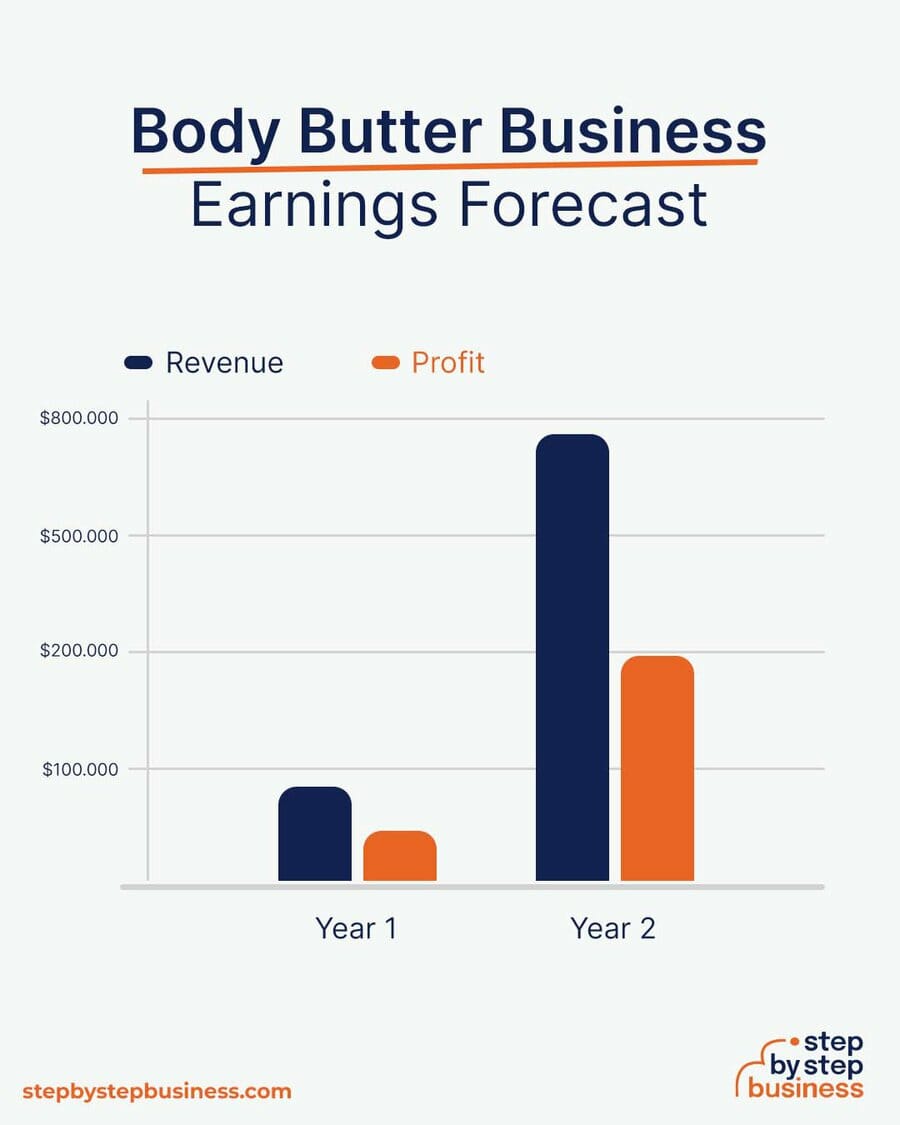
Prices for body butter vary and can range from $10 for seven to eight ounces up to $40 or more for the same size. These calculations will assume that you can produce one container for $4 and will sell it for $15. After all your other costs, such as marketing costs, you should have a profit margin of about 60%
In your first year or two, you could sell 100 items online per week, bringing in $78,000 in revenue. This would mean $46,800 in profit, assuming that 60% margin.
As you gain traction and find a manufacturer, sales could climb to 1000 items per week. At this stage, you might have an inventory storage and shipping facility and hire staff, reducing your margin to around 25%. With annual revenue of $780,000, you’d make a tidy profit of $195,000.
There are a few barriers to entry for a body butter business. Your biggest challenges will be:

Now that you know what’s involved in starting a body butter business, it’s a good idea to hone your concept in preparation to enter a competitive market.
Market research could give you the upper hand even if you’ve got the perfect product. Conducting robust market research is crucial, as it will help you better understand your customers, your competitors, and the broader business landscape.
Research body butter businesses to examine their products, price points, and customer reviews.
This should identify areas where you can strengthen your business and gain a competitive edge to make better business decisions.
You’re looking for a market gap to fill. For instance, maybe the market is missing a business that sells lavender scented body butter, or a body butter sunscreen business.
You might consider targeting a niche, such as body butter for eczema.
Once you choose a niche, you’ll need to develop your product recipes. Consider offering a choice of scents in whatever niche product you choose.
Your prices should be based on market prices, but also on your costs to make or manufacture your products.
Once you know your costs, use this Step By Step profit margin calculator to determine your mark-up and final price points. Remember, the prices you use at launch should be subject to change if warranted by the market.
You’ll need to determine the type of target market you want to attract, and design your products and packaging accordingly. For example, if you want to attract a higher end market so that you can charge higher prices, you’ll want to make high quality products and design more elegant packaging.
In the early stages, you may want to run your business from home to keep costs low. But as your business grows, you’ll likely need to hire workers for various roles and may need to rent out an inventory storage and shipping facility. You also might be considering renting a mall kiosk space to sell your products. You can find commercial space to rent in your area on sites such as Craigslist, Crexi, and Instant Offices.
When choosing a commercial space, you may want to follow these rules of thumb:

Here are some ideas for brainstorming your business name:
Once you’ve got a list of potential names, visit the website of the US Patent and Trademark Office to make sure they are available for registration and check the availability of related domain names using our Domain Name Search tool. Using “.com” or “.org” sharply increases credibility, so it’s best to focus on these.
Finally, make your choice among the names that pass this screening and go ahead and reserve your business name with your state, start the trademark registration process, and complete your domain registration and social media account creation.
Your business name is one of the key differentiators that sets your business apart. Once you pick a name, reserve it and start with the branding, it’s hard to switch to a new name. So be sure to carefully consider your choice before moving forward.
Here are the key components of a business plan:

If you’ve never created a business plan, it can be an intimidating task. You might consider hiring a business plan specialist to create a top-notch business plan for you.
Registering your business is an absolutely crucial step — it’s the prerequisite to paying taxes, raising capital, opening a bank account, and other guideposts on the road to getting a business up and running.
Plus, registration is exciting because it makes the entire process official. Once it’s complete, you’ll have your own business!
Your business location is important because it can affect taxes, legal requirements, and revenue. Most people will register their business in the state where they live, but if you are planning to expand, you might consider looking elsewhere, as some states could offer real advantages when it comes to body butter businesses.
If you’re willing to move, you could really maximize your business! Keep in mind, it’s relatively easy to transfer your business to another state.
Business entities come in several varieties, each with its pros and cons. The legal structure you choose for your body butter business will shape your taxes, personal liability, and business registration requirements, so choose wisely.
Here are the main options:

We recommend that new business owners choose LLC as it offers liability protection and pass-through taxation while being simpler to form than a corporation. You can form an LLC in as little as five minutes using an online LLC formation service. They will check that your business name is available before filing, submit your articles of organization, and answer any questions you might have.
Choose Your State
The final step before you’re able to pay taxes is getting an Employer Identification Number, or EIN. You can file for your EIN online or by mail or fax: visit the IRS website to learn more. Keep in mind, if you’ve chosen to be a sole proprietorship you can simply use your social security number as your EIN.
Once you have your EIN, you’ll need to choose your tax year. Financially speaking, your business will operate in a calendar year (January–December) or a fiscal year, a 12-month period that can start in any month. This will determine your tax cycle, while your business structure will determine which taxes you’ll pay.
The IRS website also offers a tax-payers checklist, and taxes can be filed online.
It is important to consult an accountant or other professional to help you with your taxes to ensure you are completing them correctly.
Securing financing is your next step and there are plenty of ways to raise capital:
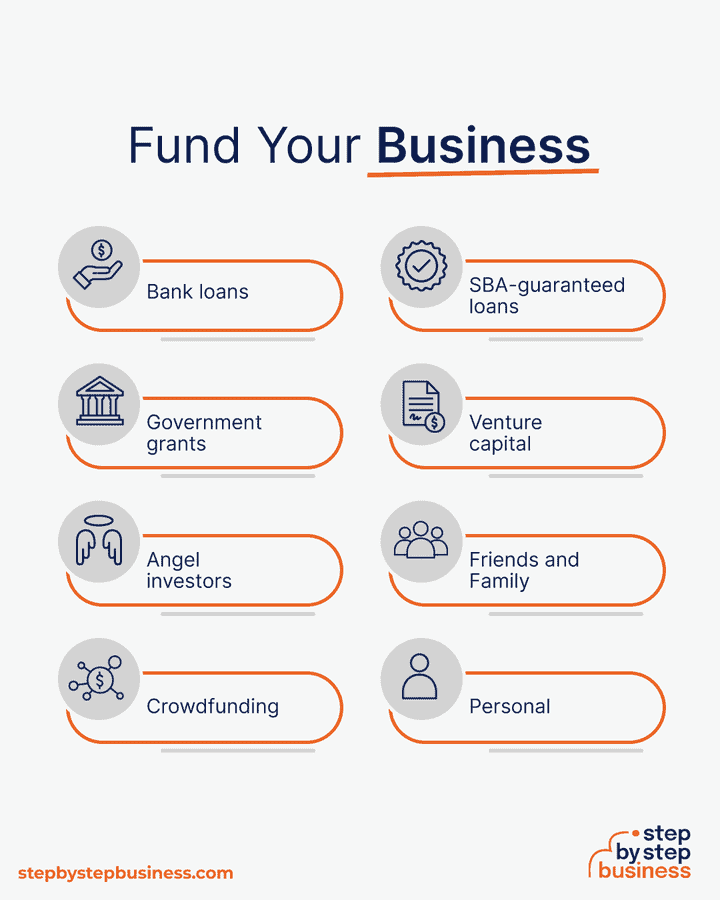
Bank and SBA loans are probably the best option, other than friends and family, for funding a body butter business. You might also try crowdfunding if you have an innovative concept.

Starting a body butter business requires obtaining a number of licenses and permits from local, state, and federal governments.
Federal regulations, licenses, and permits associated with starting your business include doing business as (DBA), health licenses and permits from the Occupational Safety and Health Administration (OSHA), trademarks, copyrights, patents, and other intellectual properties, as well as industry-specific licenses and permits.
You may also need state-level and local county or city-based licenses and permits. The license requirements and how to obtain them vary, so check the websites of your state, city, and county governments or contact the appropriate person to learn more.
You could also check this SBA guide for your state’s requirements, but we recommend using MyCorporation’s Business License Compliance Package. They will research the exact forms you need for your business and state and provide them to ensure you’re fully compliant.
This is not a step to be taken lightly, as failing to comply with legal requirements can result in hefty penalties.
If you feel overwhelmed by this step or don’t know how to begin, it might be a good idea to hire a professional to help you check all the legal boxes.
Before you start making money, you’ll need a place to keep it, and that requires opening a bank account.
Keeping your business finances separate from your personal account makes it easy to file taxes and track your company’s income, so it’s worth doing even if you’re running your body butter business as a sole proprietorship. Opening a business bank account is quite simple, and similar to opening a personal one. Most major banks offer accounts tailored for businesses — just inquire at your preferred bank to learn about their rates and features.
Banks vary in terms of offerings, so it’s a good idea to examine your options and select the best plan for you. Once you choose your bank, bring in your EIN (or Social Security Number if you decide on a sole proprietorship), articles of incorporation, and other legal documents and open your new account.
Business insurance is an area that often gets overlooked yet it can be vital to your success as an entrepreneur. Insurance protects you from unexpected events that can have a devastating impact on your business.
Here are some types of insurance to consider:


As opening day nears, prepare for launch by reviewing and improving some key elements of your business.
Being an entrepreneur often means wearing many hats, from marketing to sales to accounting, which can be overwhelming. Fortunately, many websites and digital tools are available to help simplify many business tasks.
You may want to use industry-specific software, such as Craftybase, or NetSuite, to manage your inventory, orders, and payments.
Website development is crucial because your site is your online presence and needs to convince prospective clients of your expertise and professionalism. You can create your own website using services like WordPress, Wix, or Squarespace. This route is very affordable, but figuring out how to build a website can be time-consuming. If you lack tech-savvy, you can hire a web designer or developer to create a custom website for your business.
Your customers are unlikely to find your website, however, unless you follow Search Engine Optimization (SEO) practices. SEO will help your website appear closer to the top in relevant search results, a crucial element for increasing sales.
Make sure that you optimize calls to action on your website. Experiment with text, color, size, and position of calls to action such as “Buy Now” or “Order”. This can sharply increase purchases.
Here are some powerful marketing strategies for your future business:

Unique selling propositions, or USPs, are the characteristics of a product or service that sets it apart from the competition. Customers today are inundated with buying options, so you’ll have a real advantage if they are able to quickly grasp how your body butter business meets their needs or wishes. It’s wise to do all you can to ensure your USPs stand out on your website and in your marketing and promotional materials, stimulating buyer desire.
Global pizza chain Domino’s is renowned for its USP: “Hot pizza in 30 minutes or less, guaranteed.” Signature USPs for your body butter business could be:
You may not like to network or use personal connections for business gain. But your personal and professional networks likely offer considerable untapped business potential. Maybe that Facebook friend you met in college is now running a body butter business, or a LinkedIn contact of yours is connected to dozens of potential clients. Maybe your cousin or neighbor has been working in body butter for years and can offer invaluable insight and industry connections.
The possibilities are endless, so it’s a good idea to review your personal and professional networks and reach out to those with possible links to or interest in body butter. You’ll probably generate new customers or find companies with which you could establish a partnership. Online businesses might also consider affiliate marketing as a way to build relationships with potential partners and boost business.

If you’re starting out small from a home office, you may not need any employees. But as your business grows, you will likely need workers to fill various roles. Potential positions for a body butter business include:
At some point, you may need to hire all of these positions or simply a few, depending on the size and needs of your business. You might also hire multiple workers for a single role or a single worker for multiple roles, again depending on need.
Free-of-charge methods to recruit employees include posting ads on popular platforms such as LinkedIn, Facebook, or Jobs.com. You might also consider a premium recruitment option, such as advertising on Indeed, Glassdoor, or ZipRecruiter. Further, if you have the resources, you could consider hiring a recruitment agency to help you find talent.

The body butter market is growing, presenting a wonderful opportunity for the creative entrepreneur. A body butter business can easily be started on a small scale, and grow over time – there’s no limit. You could even expand into other skin care products and eventually have your own skin care line.
Now that you understand what’s involved, you’re ready to mix up some recipes and get your successful body butter business off the ground!

Published on August 12, 2022
Had enough of supervisors breathing down your neck? Maybe it’s time to be your own boss. If you decide to start a business, your top options willm ...
Read Now

Published on July 28, 2022
The beauty industry is huge, and still growing. The US is one of the largest markets, and there’s always room for appealing and innovativeprod ...
Read Now

Published on July 14, 2022
Even before the coronavirus pandemic swept the world, consumers were spending more on products focused on better health, nutrition and immunity. Ify ...
Read Now
No thanks, I don't want to stay up to date on industry trends and news.
Comments